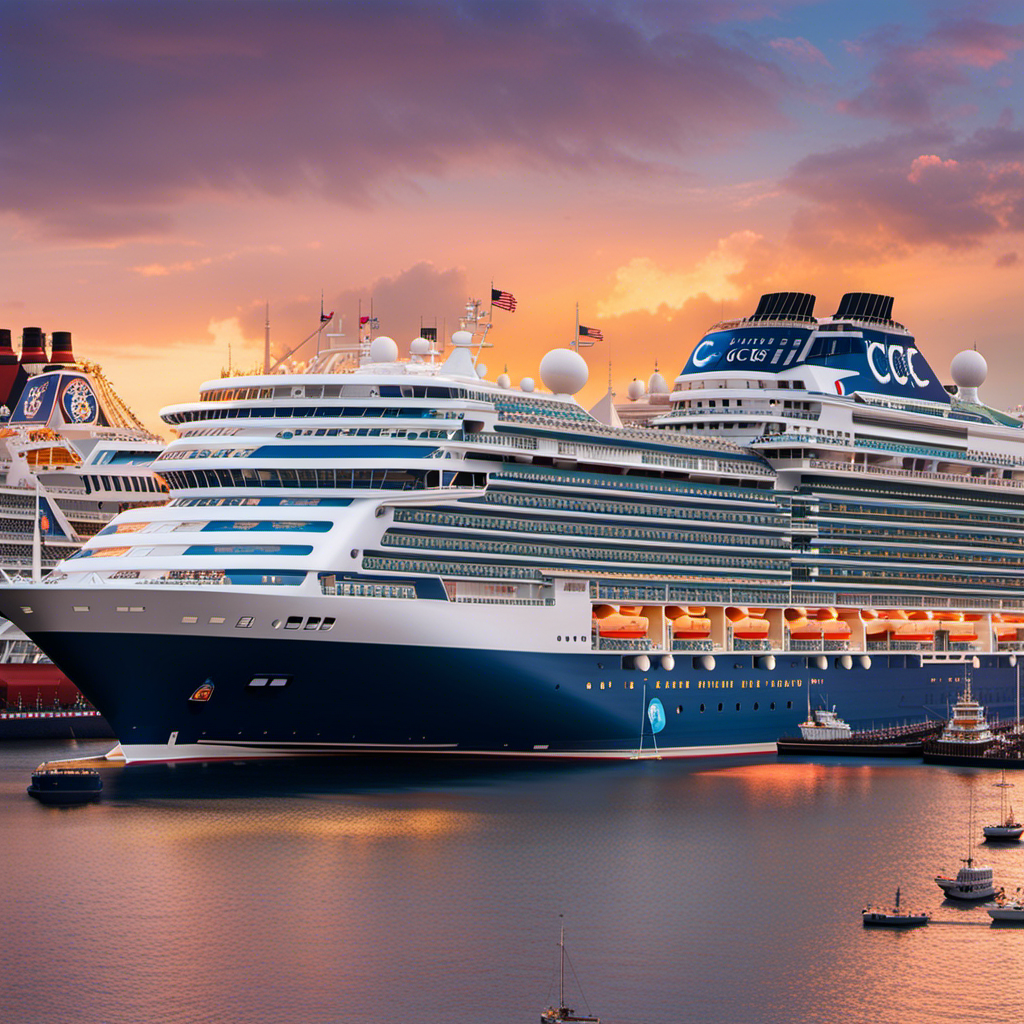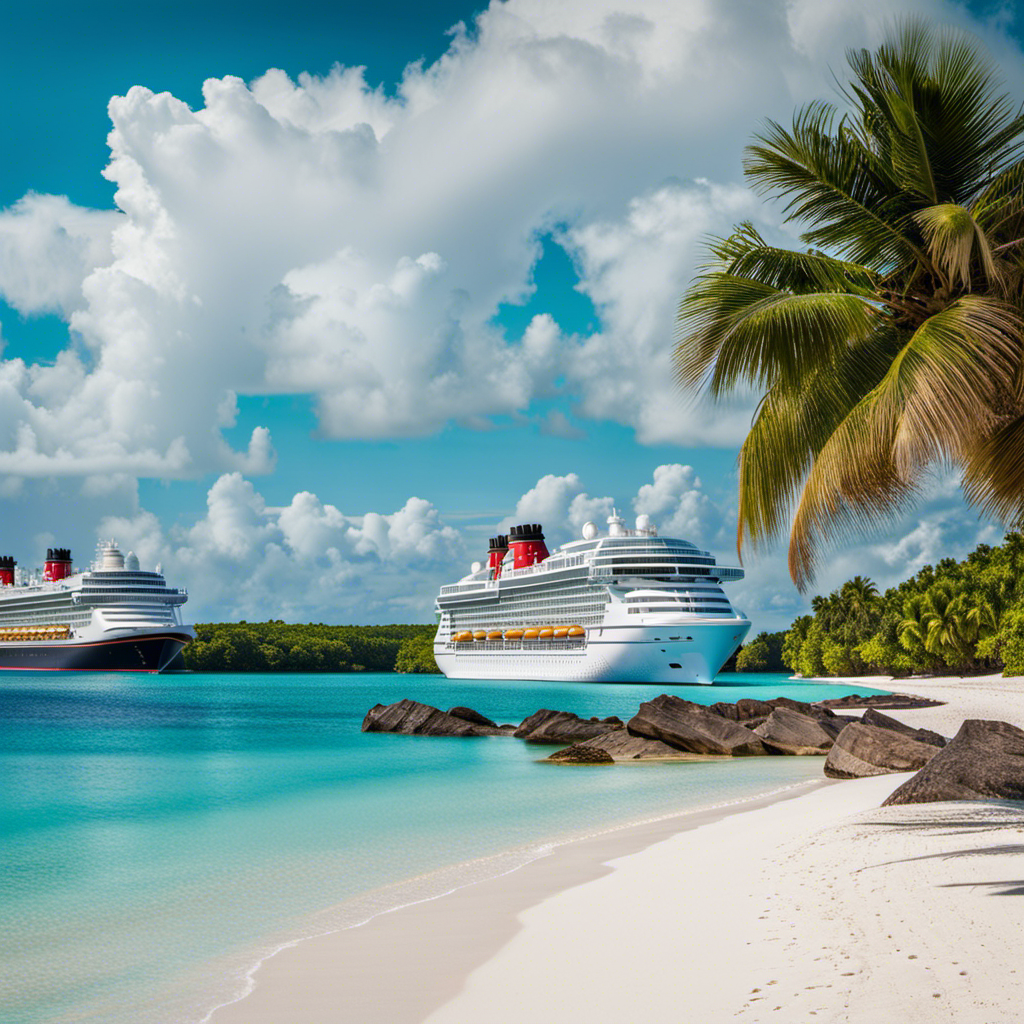As a fervent fan of cruising, I’m excited to announce that a large portion of cruise ships have smartly opted to participate in the CDC’s voluntary COVID-19 Program for Cruise Ships.
With 110 out of 113 ships participating, including renowned lines like Carnival, Royal Caribbean, Norwegian Cruise Line, and Disney, this program prioritizes the safety of passengers and crew during these challenging times.
By following the CDC’s health requirements, such as vaccination, testing, and reporting, these cruise lines are reinforcing their commitment to providing a secure and enjoyable experience for all.
Key Takeaways
- 110 out of 113 cruise ships have opted into the CDC’s voluntary COVID-19 Program for Cruise Ships.
- The new program categorizes ships based on vaccination status.
- Cruise lines like Carnival, Royal Caribbean, Norwegian Cruise Line, and Disney have joined the program.
- Passengers are unlikely to see significant changes in day-to-day operations.
Participation of Cruise Ships in CDC’s Voluntary Program
I’m glad to see that the majority of cruise ships have chosen to participate in the CDC’s voluntary program. This decision has had a significant impact on the cruise ship industry, as it demonstrates a commitment to ensuring the safety and well-being of both passengers and crew members.
By opting into the program, cruise lines are actively addressing public concerns about health and safety, which in turn has a positive effect on public perception and confidence in cruise ship travel. Knowing that these ships are following the CDC’s health requirements, including vaccination, testing, and reporting, provides reassurance to potential travelers.
This voluntary program not only reinforces existing health protocols but also shows a willingness to adapt and evolve in response to the ongoing pandemic.
Key Differences Between the Voluntary Program and CSO
Nearly all ships have embraced the new program, which establishes different guidelines based on vaccination status and includes specific quarantine rules for close contacts. The key differences between the Voluntary Program and the previous Conditional Sailing Order (CSO) are significant. Under the new program, ships are categorized based on vaccination status, with different guidelines for not highly vaccinated, highly vaccinated, and vaccination standard of excellence. Additionally, there are specific quarantine rules for close contacts of positive cases, with varying requirements for vaccinated and unvaccinated individuals. These differences in quarantine guidelines have a significant impact on the cruise industry. Cruise lines that have opted into the program, such as Carnival, Royal Caribbean, Norwegian Cruise Line, and Disney, are reinforcing health protocols and providing reassurance for passengers concerned about health on a cruise. This is crucial for the industry’s recovery and rebuilding passenger trust.
| Voluntary Program | Conditional Sailing Order | |
|---|---|---|
| 1 | Based on vaccination status | No such categorization |
| 2 | Different quarantine rules for close contacts | No specific guidelines |
| 3 | Varies for vaccinated and unvaccinated individuals | No distinction |
| 4 | Reinforces health protocols, provides reassurance | No such emphasis |
Table: Key Differences Between the Voluntary Program and CSO
Opt-in Rate and Participating Cruise Lines
Almost all the cruise lines, including Carnival, Royal Caribbean, Norwegian Cruise Line, and Disney, have opted into the new program.
The impact of the CDC’s Voluntary Program on cruise ships has been significant. With 110 out of 113 ships participating, it shows a strong commitment to ensuring the safety of passengers and crew during the ongoing pandemic. By following the CDC’s health requirements, including vaccination, testing, and reporting, cruise lines have successfully kept COVID-19 cases low.
Participating in the Voluntary Program provides numerous benefits, such as reinforcing health protocols, providing reassurance for concerned passengers, and allowing for potential changes, like easing masking rules and excluding young children from vaccination calculations.
The high opt-in rate of cruise lines demonstrates their dedication to maintaining a safe and healthy environment for all onboard.
Potential Changes for Passengers
Passengers can expect minimal disruptions to their day-to-day experience as cruise lines have already implemented protocols for testing, vaccinations, and masking. The easing of masking rules and the exclusion of young children from vaccination calculations are two potential changes that passengers may notice. Here are five key points to consider:
- Cruise lines have been successful in keeping COVID-19 cases low with the implementation of protocols.
- The new program categorizes ships based on vaccination status, with different guidelines for vaccinated and unvaccinated individuals.
- Kids under five are excluded from the 95% vaccination calculation.
- The voluntary program reinforces health protocols, providing reassurance for passengers concerned about health on a cruise.
- The CDC’s color-coded daily reports show a decrease in COVID-19 cases on cruise ships.
Overall, passengers can feel confident in the measures taken by cruise lines to ensure their safety during the ongoing pandemic.
Announcement and Expiration of the Conditional Sailing Order
After the CDC’s Conditional Sailing Order expired, there was an announcement of a new program for cruise ships. The expiration of the order had an impact on the cruise industry, as it marked the end of the stringent guidelines and protocols that ships had to follow.
However, the industry’s response has been positive, with the majority of cruise ships opting into the CDC’s voluntary program for COVID-19. This new program replaces the previous Conditional Sailing Order and requires ships to adhere to CDC’s health requirements, including vaccination, testing, and reporting.
The industry has shown a willingness to participate in the program, with 110 out of 113 cruise ships joining. This demonstrates the commitment of cruise lines to keep COVID-19 cases low and ensure the safety of passengers and crew.
The industry’s response to the expiration of the Conditional Sailing Order reflects a proactive approach towards maintaining health protocols and providing reassurance for passengers concerned about their health while on a cruise.
Requirements and Recommendations for Cruise Lines
The announcement and expiration of the Conditional Sailing Order set the stage for the cruise industry to implement new requirements and recommendations.
The impact on the cruise ship industry has been significant, with the majority of cruise ships choosing to opt into the CDC’s voluntary program.
This decision demonstrates the industry’s recognition of the effectiveness of the CDC’s health requirements in ensuring the safety of passengers and crew during the ongoing pandemic.
With 110 out of 113 cruise ships participating in the program, it’s clear that cruise lines are committed to following the CDC’s protocols, including vaccination, testing, and reporting.
The implementation of these measures has already proven successful in keeping COVID-19 cases low on cruise ships.
As a result, passengers can expect minimal changes in day-to-day operations, with the reassurance of reinforced health protocols.
Ensuring Safety of Passengers and Crew
As a participant in the CDC’s new program, I can attest to the reinforced health protocols that ensure the safety of both passengers and crew.
The effectiveness of the CDC’s Voluntary Program is evident in the impact of vaccination on cruise ship safety. With the majority of cruise ships opting into the program, vaccination rates have significantly increased. This has led to a decrease in COVID-19 cases on board.
The program categorizes ships based on vaccination status, allowing for different protocols for vaccinated and unvaccinated individuals. Passengers are unlikely to see major changes in day-to-day operations, as cruise lines have already implemented protocols for testing, vaccinations, and masking.
The voluntary program provides reassurance for passengers concerned about health on a cruise, as it ensures that cruise lines are following all CDC recommendations.
Continuation of CDC’s Health Program by Majority of Cruise Ships
Continuing with the topic of ensuring the safety of passengers and crew, it is worth noting that the majority of cruise ships have chosen to continue participating in the CDC’s voluntary health program.
This program, which replaces the previous Conditional Sailing Order, requires ships to adhere to CDC’s health requirements, including vaccination, testing, and reporting protocols.
By opting into this program, cruise lines have demonstrated their commitment to maintaining low COVID-19 cases onboard. The program categorizes ships based on vaccination status and includes guidelines for quarantine and close contacts of positive cases.
Passengers are unlikely to see significant changes in day-to-day operations, as cruise lines have already implemented protocols for testing, vaccinations, and masking.
The continuation of the CDC’s health program reinforces existing health protocols and provides reassurance for passengers concerned about their well-being on a cruise.
Frequently Asked Questions
How Many Cruise Ships Have Opted Into the Cdc’s Voluntary Program?
As of now, 110 out of 113 cruise ships have joined the CDC’s voluntary program. The program has proven effective in maintaining low COVID-19 cases and ensures the safety of passengers and crew.
Which Cruise Lines Have Chosen to Participate in the Program?
Carnival, Royal Caribbean, Norwegian, and Disney are among the cruise lines participating in the CDC’s voluntary program. Children under five are exempt from vaccination calculations.
Are There Any Exemptions for Children Under the Age of Five in Regards to Vaccination Requirements?
Yes, there are exemptions for children under five in vaccination requirements on cruise ships. This can impact families with young children, as they may not be included in the 95% vaccination calculation.
What Are Some Potential Changes That Passengers May Experience as a Result of the Voluntary Program?
Potential changes for passengers as a result of the voluntary program include minor adjustments to masking rules, excluding kids under five from vaccination calculations, and reinforcing existing health protocols. The program ensures passenger safety and provides reassurance.
How Do the Cdc’s Color-Coded Daily Reports Reflect the Success of the Program in Reducing COVID-19 Cases on Cruise Ships?
The CDC’s daily reports provide insight into the success of the program in reducing COVID-19 cases on cruise ships. These color-coded reports demonstrate the effectiveness of the program in curbing the spread of the virus.
Alfons is the visionary leader and driving force behind Voyager Info’s success. As the Editor in Chief, he brings a wealth of experience and an unwavering passion for travel to the helm of our cruise-centric platform.
With a lifelong fascination for exploring new horizons, Alfons discovered his love for the ocean and cruising at a young age. From sailing across pristine Caribbean waters to embarking on daring expeditions to far-flung destinations, he has amassed a treasure trove of first-hand experiences in the world of cruising.











